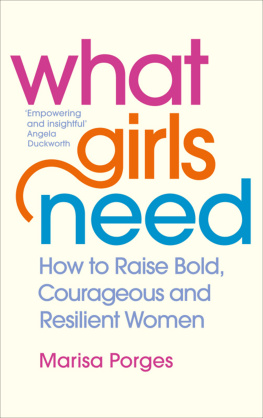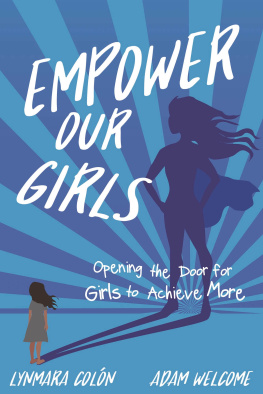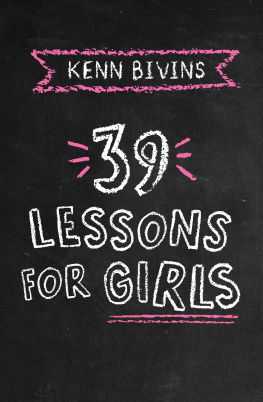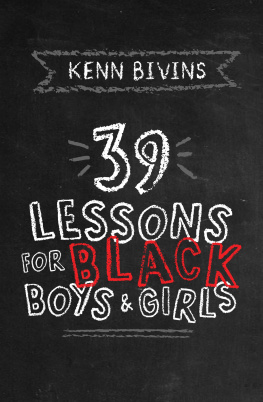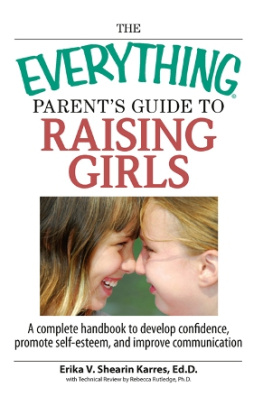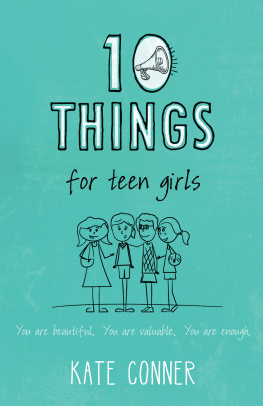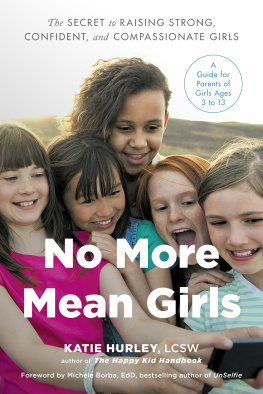
Marisa Porges
WHAT GIRLS NEED
How to Raise Bold, Courageous and Resilient Women

Contents
About the Author
Dr Marisa Porges is known for her work on leadership, education, and national security. She is currently the eighth Headmaster of The Baldwin School, a 130-year-old all-girls school outside of Philadelphia that is renowned for academic excellence and preparing girls to be leaders and change-makers. Prior to joining Baldwin, Dr Porges was a leading counterterrorism and national security expert serving in such places as the Obama White House and the US Navy. Porges has a bachelors degree in geophysics from Harvard University, a masters degree in comparative politics from the London School of Economics, and a doctorate in security studies from Kings College London. Her awards include the National Committee on American Foreign Policy 21st Century Leader Award and the NATO Medal for service in Afghanistan.
For Scott, what every girl needs in a partner and best friend
Authors Note
What Girls Need
I vividly remember the first time I lost my voicenot my actual voice, but the ability to speak my mind and stand my ground.
I was a second-year student in college, in the midst of summer training for the U.S. military. With the stubborn confidence of a nineteen-year-old, I delighted in wearing a borrowed flight suit to work each day and doing odd jobs at a naval aviation squadron in Jacksonville, Florida. Even as a glorified intern, Id call my parents to breathlessly share stories of what life was like as a naval aviator. I pictured childhood dreams of life as a fighter jet pilot coming true and imagined how things would unfold from there. It was going just as Id hoped until the sticky summer day when a senior officer, a trained Navy pilot with years of experience and expertise, pulled me aside in the squadron ready room and sneeringly told me that naval aviation wasnt for me. That Id never cut it as an aviator because I was a girl.
The slap of those words stings to this day. Whats worse, I still cringe when I recall my muted response. I didnt know what to say or how to respond. I was at a loss for how to stand up for myself.
When I remember this moment and the feeling of being unfairly attacked and left reeling, unprepared to advocate for myself, its hard not to let my mind spiral to other painful memories. I wince when I recall that I failed at negotiating because I didnt know how to ask effectively. Or when I think of that coveted job I didnt get because I didnt even compete for the opportunity. Then there were the missed chances to network in a room full of men, when I underrated my natural ability to develop relationships and connect with others in a uniquely personal, empathetic way. Like many women, I keep a neatly organized and overstuffed mental file of these moments and moreall the times when subtly, often unconsciously, and always regrettably, I sensed that because Im a girl held me back rather than served as my competitive edge.
Looking back on these and other moments involves a mix of regret and embarrassment, but also quiet gratitudegratitude because over time these missteps taught me critical lessons about how to navigate the real world. These are lessons that I didnt get when I was young but that made all the difference later on, personally and professionally. Lessons that eventually helped me realize my dream of flying jets off aircraft carriers despite being too short to see over the jets dashboard, too light for the ejection seat, and typically the token girl in a roomful of men.
Now I can see that my moments of failure and success taught me as much as the lessons my parents, teachers, and mentors intentionally crafted for me, and honed critical life skills that Ive relied on ever since. These experiences helped me to survive wandering through southern Afghanistan, conducting interviews with former Taliban and local tribal leaders during the height of fighting season, despite traveling solo, with no security detail by my side or weapon in my handbag, and being one of the only Jewish American women my Afghan contacts had ever met. The skills I gained over the years also helped me navigate the politics of the White House and the drama of the Pentagon, where I shaped U.S. counterterrorism and cybersecurity efforts under two presidents, despite constantly being aware of the length of my hair (a male colleague had advised me to keep it long), of the style of my clothes (another had told me to be mindful of wearing stylish high boots to work), and of the fact that I was making less money than my male peers (again, the result of my poor negotiating skills). All of these life lessons now guide my daily work, helping me give the nearly six hundred young girls at my school what they need to succeed, in class and in life.
As the head of the Baldwin School in the suburbs of Philadelphia, I lead a 130-year-old all-girls school for students from reception to the end of secondary school. Baldwin was founded on the premise that an education specially tailored to young women can propel them to break barriers in a male-dominated world. I spend every day thinking about what works and what doesnt for girls and partnering with parents and teachers to understand the dynamics at play for young women, socially and emotionally. Because Baldwin is a school known for challenging girls academically and shaping them as future leaders, we focus on providing girls with specific tools to ensure they succeed after graduation, in any and every environment. And we dont ignore the fact that all of our girls are likely to face major hurdles in life specifically because theyre womenand that we must teach them early on how to meet these challenges head-on and how to take advantage of the innate talents that set them apart.
Not because girls need to be more like boys, or women more like men, in spite of the clichs about a woman needing to behave like a man to excel in a mans world. But as gender dynamics slowly and finally evolve, we need to think differently about how we prepare our girls to be the leaders, innovators, and game-changers they dream of becoming. Every girl should learn skills early on that empower her to be her best self. So that our girls grow into women able to apply grit, confidence, and bravery in real-world situations and effectively advocate for themselves. So that our daughters have the skills needed not just to compete with men but to turn their intrinsic talents into competitive advantages. So that our girls create their own success, no matter what the future holds and whatever comes their way.
What Girls Need describes what is essential for every young girl to learn early on and outlines how parents, teachers, friends, and family can help young girls develop the skills they need to become not just self-assured but feisty, too. Not just brave but bold. Not just confident but audacious. The chapters that follow use social science research, case studies, and examples from around the world, as well as personal stories from my time flying for the U.S. Navy, working in the White House, and traveling through the Middle East, to describe what we can do for girls to give them an edge as adult women. That way they can thrive, personally and professionally, even in the face of gender-based discrimination and sexual harassment.
The girls I work with each day are examples of why these lessons are so critical for todays young women. They are fortunate to have one of the best educations in the nation at their fingertips, and Im constantly impressed by how hard they work and how talented they are. But they are still concerned about whats to come and how they will handle the fast-changing and unknown future. Their parents are worried, too. They fear that their girls confidence wont matter the first time they are spoken overor down toat a meeting, despite being expert in whatever is being discussed. They are concerned that all the resilience in the world wont matter when their daughters first boss makes a pass at them. They fear that their girls wont be fully prepared to successfully navigate and feel empowered in the twenty-first-century world, and that no matter how much education and training they provide, their little girls might not be ready for the gender bias that still pervades society.
Next page
